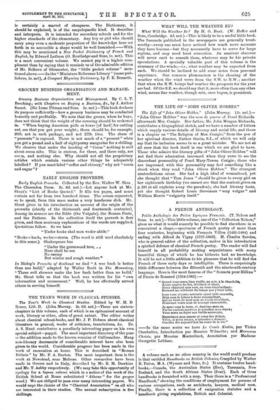EARLY ENGLISH PROVERBS.
Early English Proverbs. Collected by the Rev. Walter W. Skea , The Clarendon Press. as. Gd. net.)—Let anyone look at Mr. Skeat's "List of Books Quoted." It fills ten pages, and must contain not far from two hundred items. The cream separated, so to speak, from this mass makes a very handsome dish. Mr. Skeet gives in his introduction an account of the origin of the proverbs (chiefly of the thirteenth and fourteenth centuries). Among its sources are the Bible (the Vulgate), the Roman Poets, and the Fathers. In the collection itself the proverb is first given, and then necessary explanations of the words are supplied. Quotations follow. So we have
" Under boske shat men wader abide."
" Boske =bush; weder= storm. (The word is still used absolutely in this sense.) Shakespeare has
"Under the greenwood tree, . Here shall he see
No enemy But winter and rough weather."
In Hislop's Proverbs of Scotland we find "A wee bush is better than nae beild," adapted by Walter Scott in The Monastery, " These evil showers make the low bush better than no beild.' Mr. Skeat tells us that the book was written for his " own information and amusement." Well, he has effectually served others in serving himself.


























































 Previous page
Previous page